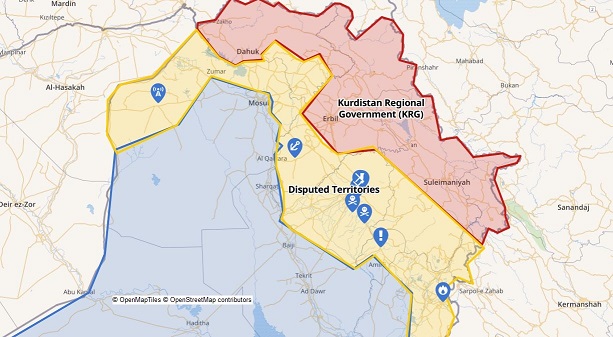1.4K
Kirkuk
- Iraq’s Minister of Defense has ordered the eviction of 150 Kurdish families. The minister ordered the expulsion after former owners, mostly senior al-Ba’ath officers, claimed the ownership of the homes after 17 years of fleeing due to involvement in war crimes. The Kurdish families were displaced before 2003 and were given houses by the Kurdish parties. Additionally, the North Oil Company (NOC) threatened to evict 263 displaced Kurdish families from homes “they built on NOC lands” in 2003. Since October 16, 2017, the Iraqi government has restored the Arabization policies against the Kurds.
- On National Clothing Day, March 10, the authorities at the University of Kirkuk prevented Kurdish students entry because they were wearing Kurdish clothes. The decision was taken by the President of the University, Omran Jamal Hassan, who’s also the deputy head of the Iranian-backed militia of al Badr in the province.
- On Tuesday, March 8, ISIS (Da’esh) launched three attacks in Kirkuk, including one against Iranian-backed militias in al-Bashir village, killing one militant. The other two attacks targeted the Kurdish Mansori village and a Federal Police post in Daquq district, resulting in the injury of two officers.
- A memorandum dated March 2, by Iraq’s Chief of the General Staff of the Iraqi Armed Forces Abdel Emir Yarallah requested the transfer of 3,693 Peshmergas of the 20th division to Iraq’s defense ministry. After the Baghdad-Erbil agreement, the Peshmerga are supposed to become part of a “second” joint military division with Iraqi forces, deploying in the disputed territories.
- For the first time since becoming acting governor, Rakan al Jabouri admitted that Kirkuk is the worst province in the country in providing electricity. During a meeting with various tribes in Kirkuk, al Jabouri said: “Kirkuk is the worst province for electricity provision,” blaming Baghdad for not providing the province with enough power. Al Jabouri said, “Kirkuk is the biggest power producing province in the country, yet it receives the least power.” Since October 16, 2017, Kirkuk has faced electricity, water and gas shortages and no waste collection leading to garbage piling up throughout the province. Currently, the province has only ten hours of “national power” per day. Separately, produce wholesale shops in the city’s Khan Khurma neighborhood were shut down for two days after owners protested the high taxation on their goods. The strike caused an increase in the prices of vegetables and fruit by 100%.
Khanaqin
- Local police in Khanaqin defused an alleged Da’esh grenade trap which was thrown into the home of a police officer. Meanwhile, the Kurdish security forces (Asayesh) have remained unable to carry weapons or conduct missions in the town since 2017. Some Kurdish officials suggested transferring them to Iraq’s National Security office.
Tuz Khurmatu
- Among 71 new police hires by the Saladin governorate for Tuz Khurmatu, only seven are Kurds, while the overwhelming majority were Shia Turkmen and Sunni Arabs. Kurds face discrimination in hiring and basic rights in the town.
- After continued security issues facing the region, a senior Iraqi security delegation visited Tuz Khurmatu on Tuesday, March 8th. The delegation, led by Abdul Amir al Shimari, deputy commander of the joint operations, met with Iranian-backed militias in the town and warned of further Da’esh attacks.
Shingal (Sinjar)
- The leader of the Yazidi bloc in the Iraqi parliament, Naif Khalaf Saido, said that the instability in the Shingal has prevented the displaced Yazidis from returning to their homes. Saido said,” More than five years have passed since Sinjar was taken from the grip of ISIS but our areas are still unstable, in terms of administration, security and services,” Saido said, describing the region as being “at the mercy of regional and domestic conflicts.” Thousands of Yazidis remain in displaced camps in the Kurdistan Region.
.
.
.

